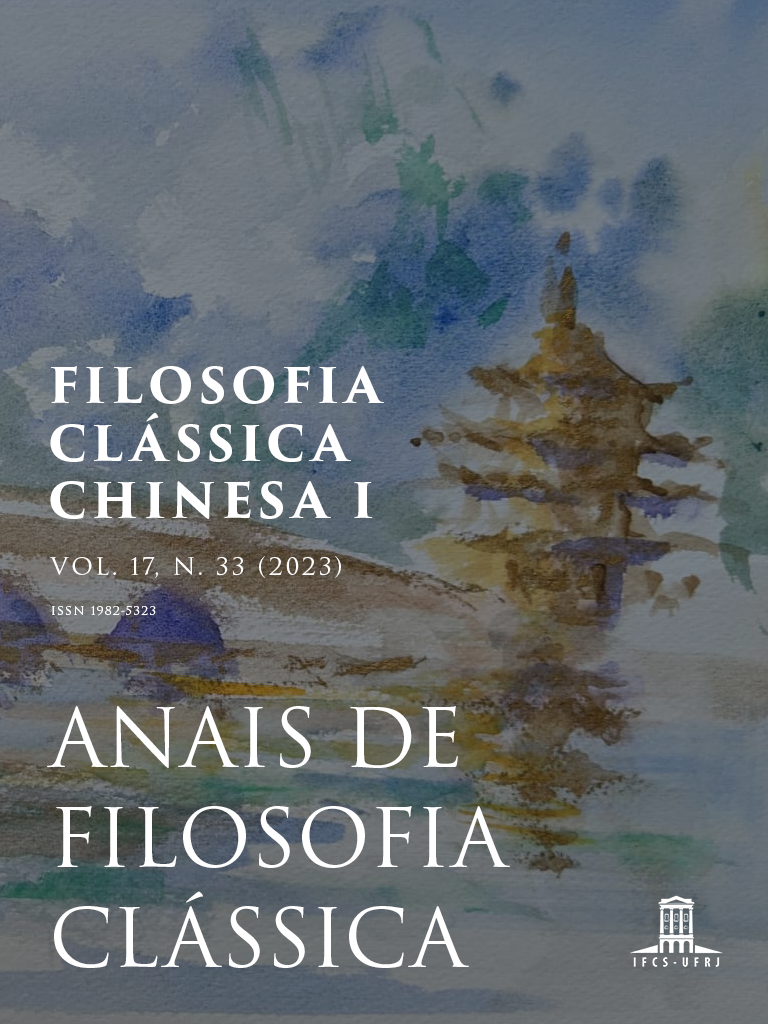Rituality as a moral and intellectual virtue
Ethics and epistemology of virtues based on Xunzi and Sosa
DOI:
https://doi.org/10.47661/afcl.v17i33.61270Keywords:
Rites, rituality, Xunzi, Sosa, intellectual virtueAbstract
In this text, I propose that there is an intellectual virtue not yet recognized in debates within the epistemology of virtues: intellectual rituality. To elucidate this, I proceed as follows: (1) I expose the relevance of rituality as a moral virtue within the virtue ethics of the Confucian tradition; (2) I highlight the formulation of rituality in the work of the philosopher Xúnzǐ 荀子; (3) I analyze the meaning of moral rituality; (4) I briefly describe central elements of Sosa’s virtue epistemology; (5) finally, based on Sosa, Tsai, and Xúnzǐ, I formulate the concept of intellectual rituality and point out some of its advantages.
Downloads
References
ABBAGNANO, Nicola. Dicionário de Filosofia. 5ª edição revista e ampliada. São Paulo: Martins Fontes: 2007.
ANGLE, Stephen; SLOTE, Michael (Ed.). Virtue ethics and Confucianism. New York: Routledge, 2013.
VAN NORDEN, Bryan. Virtue ethics and consequentialism in early Chinese philosophy. Cambridge: Cambridge University Press, 2007.
ANSCOMBE, G. E. M. Filosofia Moral Moderna. In: ZINGANO, Marco (coord.). Sobre a Ética Nicomaqueia de Aristóteles: textos selecionados. São Paulo: Odysseus, 2010, pp. 19-41.
ARISTÓTELES. Ética a Nicômaco. In: ARISTÓTELES. Ética a Nicômaco; Poética; Os pensadores, v. 2. Seleção de textos de José Américo Motta Pessanha. 4. ed. São Paulo: Nova Cultural, 1991, p. 5-196.
BORBA, Alexandre Ziani de. Uma Investigação acerca da Natureza da Virtude Intelectual e do seu Estatuto enquanto Ideal Regulador da Educação. 2020. 261 p.; Tese (doutorado) - Universidade Federal de Santa Maria, Centro de Ciências Sociais e Humanas, Programa de Pós-Graduação em Filosofia, RS, 2020.
CANTO-SPERBER, Monique; OGIEN, Ruwen. Que devo fazer? - A filosofia moral. São Leopoldo-RS: Ed. Unisinos, 2004.
CHENG, Anne. História do pensamento chinês. Tradução Gentil Evelino Titton. Petrópolis, RJ: Vozes, 2008.
CHEN, Kuan Hung. Knowledge and conduct: Zhi and the epistemic landscape in the Xunzi. 2016, 230 p. Tese (Doutorado em Filosofia). Honolulu: University of Hawaii at Manoa, 2016.
CONFÚCIO. Os Analectos. Tradução, comentários e notas de Giorgio Sinedino. São Paulo: Editora UNESP, 2012.
COSTA, M. O. Xunzi - Tradução do cap. 21 - Jie Bi 解蔽 - Livrar-se das obsessões. Anais de Filosofia Clássica (Online), v. 16, p. 171-200, 2023.
COSTA, Matheus Oliva da. Confucionismo – uma abordagem intercultural. Curitiba: Intersaberes, 2021.
COSTA, Matheus Oliva da; LI, Peter. Nomeação correta (Zheng Ming 正名) – Xunzi. Prajna – Revista de Culturas Orientais, v. 2, n. 3, p. 113-139, 2021.
CUA, Antonio S. Xunzi (Hsün Tzu). In: CUA, Antonio S. (ed.). Encyclopedia of Chinese philosophy. New York: Routledge, 2013, pp. 821-829.
DING, Zixuan. Understanding in the Xúnzǐ and Epistemology. 2021, 108 p. Dissertação (Mestrado em Filosofia). Hong Kong: The University of Hong Kong, 2021.
HUANG, Yong. Ernest Sosa encountering Chinese philosophy: an introduction. In: HUANG, Yong (Ed.). Ernest Sosa encountering Chinese philosophy: a cross-cultural approach to virtue epistemology. New York: Bloomsbury Academic, 2022, p. 1-21.
MI, Chienkuo; SLOTE, Michael Slote; SOSA, Ernest. Moral and Intellectual Virtues in Western and Chinese Philosophy: The Turn Toward Virtue. New York: Routledge, 2016.
TSAI, Cheng-Hung. Xunzi and Virtue Epistemology (荀子與德性知識論). Universitas (哲學與文化), v. 41, n. 3, 2014.
TURRI, John; ALFANO, Mark; GRECO, John. Epistemologia das virtudes. In: SANTOS, Bruno Aislã Gonçalves dos org.). Textos selecionados de filosofia das virtudes. [recurso eletrônico]. Pelotas: NEPFIL Online, 2022, p. 197-240.
SANTOS, Felipe Rocha Lima. Epistemologia e Virtudes Intelectuais: do Conhecimento ao Entendimento. Porto Alegre, RS: Editora Fi, 2018.
SATO, Masayuki. The Confucian quest for order: the original and formation of the political thought of Xun Zi. Leiden: Brill, 2003.
SCHMEICHEL Brandon J.; BAUMEISTER, Roy F.. Effortful Attention Control. In: BRUYA, Brian. Effortless attention: a new perspective in the cognitive science of attention and action. The MIT Press: Cambridge, 2010, p. 29-50.
SLINGERLAND, Edward. Toward an Empirically Responsible Ethics: Cognitive Science, Virtue Ethics, and Effortless Attention in Early Chinese Thought. In: BRUYA, Brian. Effortless attention: a new perspective in the cognitive science of attention and action. The MIT Press: Cambridge, 2010, p. 247-286.
SINEDINO, Giorgio. Introdução, comentários e notas. In: CONFÚCIO. Os Analectos. Tradução, comentários e notas de G. Sinedino. São Paulo: Editora UNESP, 2012.
SOSA, Ernest. The Raft and the Pyramid: Coherence versus Foundations in the Theory of Knowledge. Midwest Studies In Philosophy, v. 5, n. 1, pp. 3–26, 1980.
SOSA, Ernest. A Virtue Epistemology: Apt Belief and Reflective Knowledge, Volume I. Oxford: Oxford University Press, 2009.
VAN NORDEN, Bryan W. Introdução à Filosofia Chinesa Clássica. Petrópolis, RJ: Vozes, 2018.
XUNZI. Xunzi (2 vol.). Translated into English by John Knoblock, translated into Modern Chinese by Zhang Jue. Changsha/Beijing: Hunan People's Publishing House/Foreign Languages Press, 1999.
XUNZI. Xunzi. In: STURGEON, Donald. Chinese Text Project. Online: 2006. Disponível em <https://ctext.org/xunzi>. Acesso em: 03 set. 2023.
XUNZI. Xunzi: The complete text. Translated and with an introduction by Eric L. Hutton. Princeton: Princeton University Press, 2014.
EYSENCK, Michael W.; KEANE, Mark T. Emoção e Cognição. In: EYSENCK, Michael W.; KEANE, Mark T. Manual de Psicologia Cognitiva. 7ª edição. Porto Alegre: Artmed, 2017, p. 635-682.
ZAGZEBSKI, Linda. O que é conhecimento?. In: GRECO, John; SOSA, Ernest (orgs.). Compêndio de Epistemologia. Trad. Alessandra S. Fernandes, Rogério Bettoni. São Paulo: Edições Loyola, 2012, p. 233-252.
Downloads
Published
Issue
Section
License
Copyright (c) 2024 Anais de Filosofia Clássica

This work is licensed under a Creative Commons Attribution-NonCommercial-ShareAlike 4.0 International License.


